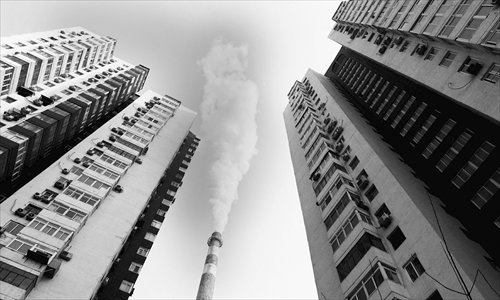Green evolution

Results released last month from a 2011 Gallup poll in China showed that more than three-quarters of respondents in Beijing prioritized environmental protection ahead of economic growth. The figure of 77 percent was the highest among first-tier cities in the country, and was a staggering 20 percent higher than the national average.
Rural residents also agreed with putting the environment first, the survey found, despite their comparatively lower awareness on environmental issues and lower incomes compared to urban dwellers.
Results of the survey, which were based on face-to-face and telephone interviews with approximately 4,200 respondents, came out on June 8 amid a weeks-long stint of gray skies and stuffy air in the capital. They also followed a sharp rebuke from China's deputy environment minister, who called for foreign embassies to stop reporting air quality in the country.
Environment a 'matter of survival'
Residents and experts are divided on whether the government or society should bear greater responsibility in protecting the environment, but they are unanimous in believing that China's predicted economic slowdown this year won't silence growing voices for a greener country.
"Protecting the environment shouldn't cause an economic slowdown," noted Shao Mingshan, a 24-year-old postgraduate student with a Masters of Fine Arts from Boston University. "The environment must be a priority - it's a matter of survival. The policies of sustainable development prove that the environment and economy aren't in conflict, rather they can go forward simultaneously."
Shao, a Beijing native, is also concerned at the lack of transparency from environmental authorities in reporting the capital's air quality.
"If they are doing everything possible to improve air quality, why should they prevent reports on it? This isn't helped by the fact citizens ignore whether the government enforces its [environmental] policies. Authorities should define their long-term goals," she added.
Only one-fifth of Chinese respondents in the survey said economic growth should trump environmental protection, down significantly from previous years. Yu Fengzhen, 57, agreed that there's "a lack of environmental awareness in Beijing" compounded by the fact "few people know about saving water and energy."
But Yu, who works at China Agricultural University, added that without a stable economy, environmental concerns shouldn't take priority. "Salaries in Beijing aren't high enough for the city's standards of living," she said. "People can only worry about the environment once their basic needs are guaranteed."
Green economy benefits
Ma Jun, a prominent environmentalist and the author of 2004 book China's Water Crisis, said the poll's results reflect the growing importance Chinese people place on environmental protection.
"There's been a significant change in public opinion as people become more aware that China's development has come at the expense of the environment," said Ma, who noted public awareness of environmental issues has been collectively fostered by the government, NGOs, the media and schools.
Ma isn't concerned at claims local authorities are trying to downplay the PM2.5 reports published by the US embassy because the standard of what is and isn't healthy "changes between countries."
However, he suggested it would be a show of confidence for the city if authorities measured and published their own results. "China should embrace the fact that it has the ability to transform its economy into a green one," he emphasized.
Ma stressed that the long-term competitiveness of the country depends on "going green."
"The rising cost of energy and raw materials alongside the rising [intangible] costs of pollution will make the most competitive companies realize they need to upgrade," he said, adding China could learn from policies in some developed countries.
Liu Ying, a professor of economics at Tsinghua University, dispelled the public misconception that the environment and economy of a country directly compete with each other, saying the challenge lies in striking synergy between the two.
"There's clearly no conflict between economic development and environmental protection," she said, adding that people's health is intrinsically linked to their environment.
"Many of my Chinese friends living in the US found that their parents, who were living in rural areas of China, died from unexpected forms of cancer. Unfortunately, people recognize environmental challenges on an individual level, such as when it affects their health or safety."
One of the biggest problems is that the public isn't fully aware of what environmental protection entails or how it can be achieved without coming at their own personal cost, she added. "Innovation is the best solution for China to evolve as a developing country. A system that punishes polluters is the right way to offset environmental damage and raise public awareness," she said.
Awareness and responsibility
China isn't alone when it comes to prioritizing the environment. Gallup's poll, which was conducted among other BRIC nations Brazil, Russia and India, showed similar sentiments were strong among the fast-growing developing economies. However, the poll didn't assess awareness and didn't offer conclusions on whether people in these countries know how they can play their part to protect the environment.
Most locals interviewed by Metro Beijing said they believe that the government should shoulder the bulk of responsibility when it comes to protecting the environment.
Liu agrees authorities should lead by example if they are to encourage greater efforts among the people. "The government still has a major role to play in setting up a mechanism that rewards innovation, in defining the policies that punish polluters and raising social awareness," said Liu.
Ma said now was the time for China to demonstrate its leadership worldwide in protecting the environment, but conceded such a move was daunting given the scope of the task.
"The economic landscape of the world has changed and BRIC countries have never had a stronger voice on global issues," he said.
"On the other hand, no country wants to take the lead because the environment is too big a task to tackle, which is why efforts from NGOs and individuals are more important than ever."
Wu Kameng contributed to this story